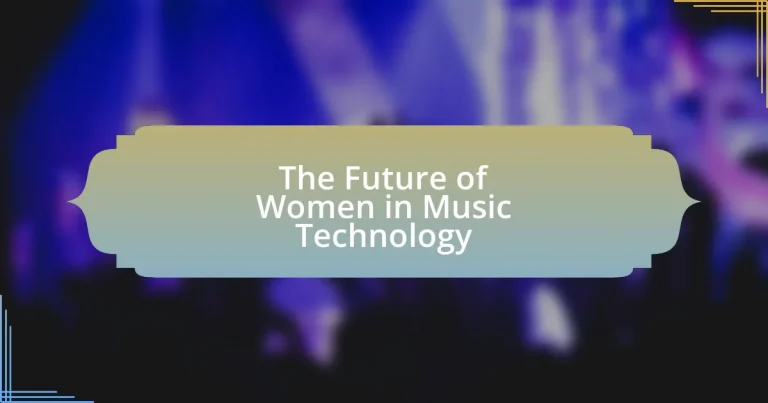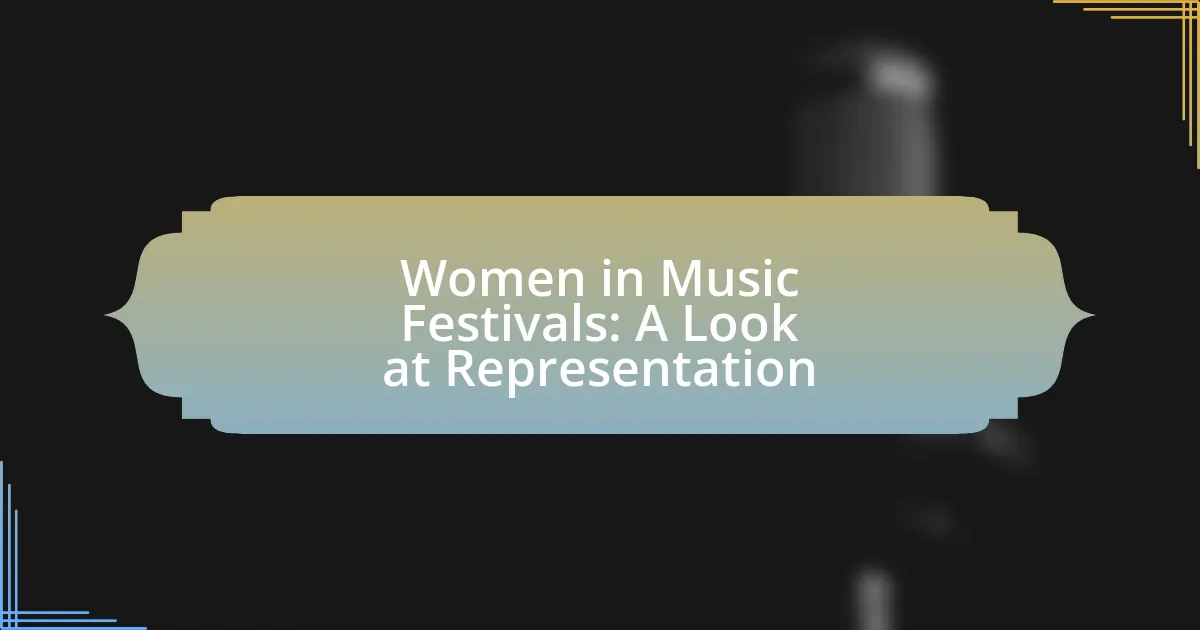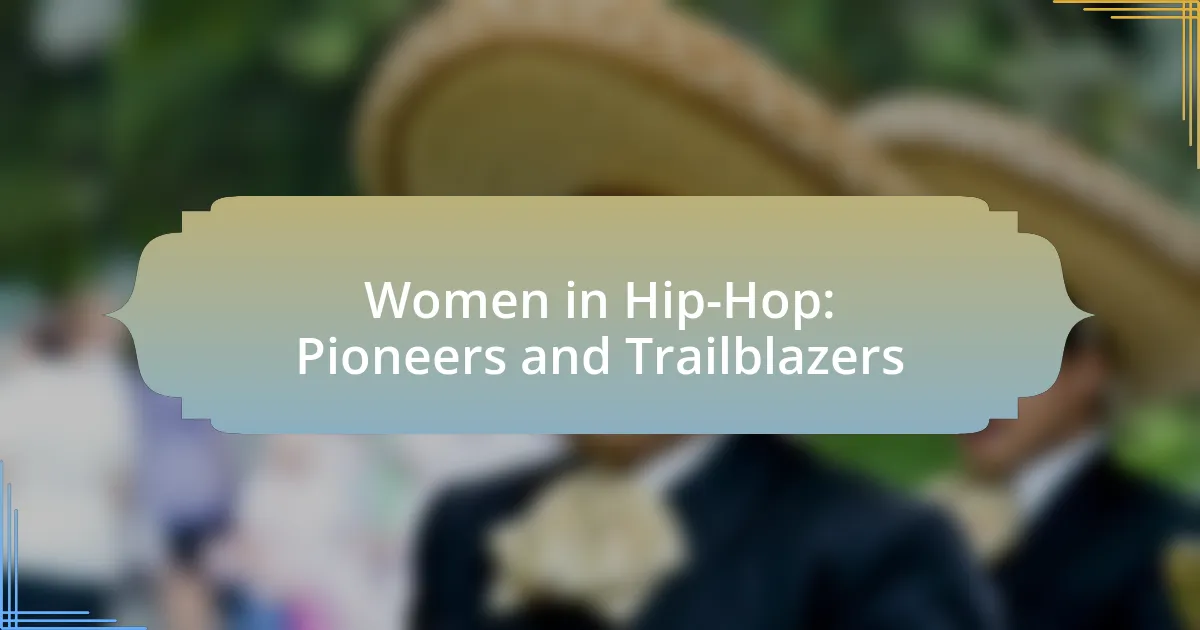The article examines the future of women in music technology, highlighting the significant growth and increased representation of women in this field as of 2023. It discusses the historical evolution of women’s roles, the challenges they face, and the barriers to entry, including gender bias and lack of mentorship. The article also outlines emerging opportunities, such as educational programs and initiatives aimed at promoting female participation, and emphasizes the impact of technology on women’s contributions to music production. Key skills for success, the importance of mentorship and networking, and practical steps for women to thrive in music technology are also addressed.
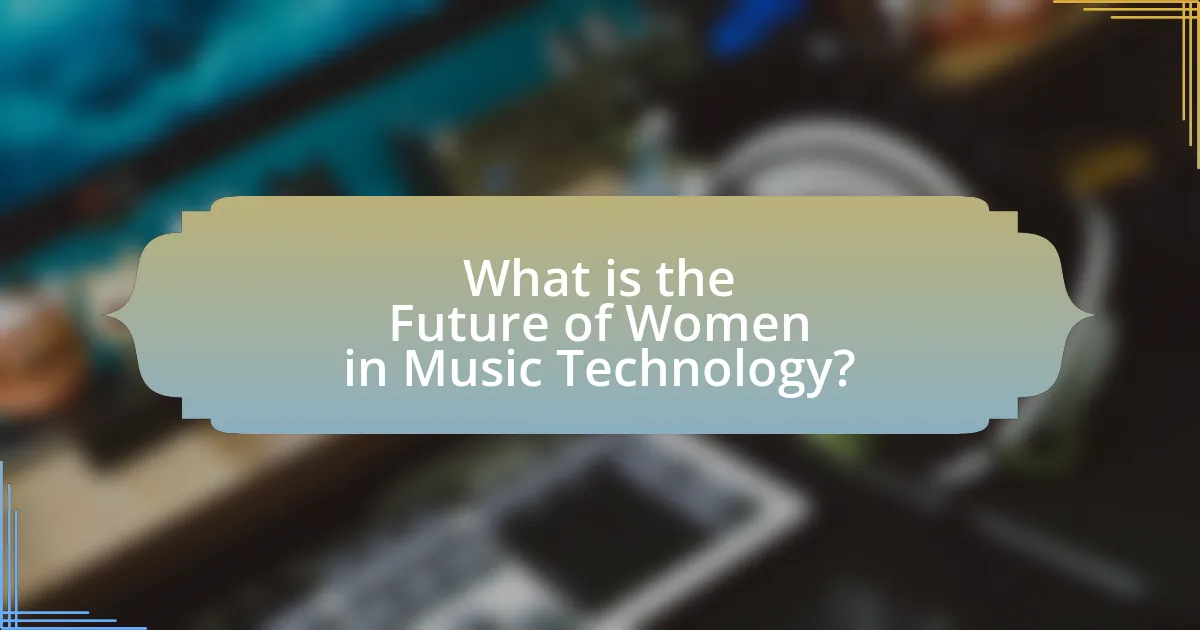
What is the Future of Women in Music Technology?
The future of women in music technology is poised for significant growth and increased representation. As of 2023, initiatives aimed at promoting gender diversity in STEM fields, including music technology, have gained momentum, with organizations like Women in Music and She Is the Music advocating for female participation. Statistics indicate that women currently hold only about 20% of technical roles in the music industry, but educational programs and mentorship opportunities are expanding, leading to a projected increase in female professionals in this sector. Furthermore, the rise of digital platforms and remote collaboration tools is creating more accessible pathways for women to enter and thrive in music technology, suggesting a positive trajectory for gender equity in the field.
How has the role of women in music technology evolved over time?
The role of women in music technology has evolved significantly from being largely marginalized to becoming influential contributors and leaders in the field. Historically, women faced barriers in accessing music technology roles, often limited to traditional roles such as performers or vocalists. However, starting in the late 20th century, women began to break into technical roles, exemplified by pioneers like Wendy Carlos, who popularized synthesizers in the 1960s, and more recently, figures like Imogen Heap, who has innovated in music technology and advocacy for women in the industry.
Statistics indicate that as of 2021, women represented approximately 20% of the music production workforce, a notable increase from previous decades. Organizations such as Women in Music and She Is the Music have emerged to support and promote women in this sector, further facilitating their growth and visibility. This evolution reflects a broader cultural shift towards inclusivity and recognition of women’s contributions in technology and music.
What historical milestones have shaped women’s participation in music technology?
Historical milestones that have shaped women’s participation in music technology include the emergence of female pioneers in the field, such as Clara Rockmore, who popularized the theremin in the 1920s, and the establishment of organizations like the Women’s Audio Mission in 2003, which focuses on training women in audio technology. Additionally, the rise of digital audio workstations in the 1990s provided accessible tools for women to create and produce music independently. These milestones demonstrate a gradual increase in visibility and opportunities for women in a traditionally male-dominated industry, supported by initiatives aimed at promoting gender equality in music technology.
How have societal changes influenced women’s roles in this field?
Societal changes have significantly influenced women’s roles in music technology by increasing opportunities for participation and recognition. The rise of feminist movements and gender equality initiatives has led to a greater emphasis on inclusivity in traditionally male-dominated fields, including music technology. For instance, organizations like Women in Music and She Knows Tech have emerged to support and promote women in this industry, providing networking opportunities and resources. Additionally, educational programs and workshops aimed at young women have increased their engagement in music technology, as evidenced by a 2019 report from the National Center for Women & Information Technology, which highlighted a 20% increase in female enrollment in STEM-related music courses over the past decade. These societal shifts have not only expanded women’s roles but also fostered a more diverse and innovative environment in music technology.
What challenges do women face in the music technology industry?
Women in the music technology industry face significant challenges, including gender bias, lack of representation, and limited access to mentorship opportunities. Gender bias manifests in hiring practices and workplace culture, often leading to women being overlooked for technical roles. According to a 2021 report by the Annenberg Inclusion Initiative, women hold only 2% of production roles in the music industry, highlighting the stark underrepresentation. Additionally, the absence of female role models and mentors in technical positions further exacerbates the issue, making it difficult for women to navigate career advancement. These challenges contribute to a less inclusive environment, ultimately hindering the growth and innovation within the music technology sector.
What barriers exist for women entering music technology?
Barriers for women entering music technology include gender bias, lack of representation, and limited access to education and resources. Gender bias manifests in workplace cultures that favor male perspectives, often leading to women feeling unwelcome or undervalued. The lack of representation is evident in industry roles, where women hold only about 5% of production positions, which discourages new entrants. Additionally, limited access to education and resources, such as mentorship programs and networking opportunities, further hinders women’s entry into this field. Studies indicate that these barriers contribute to a significant gender gap in music technology, impacting women’s career advancement and participation.
How do gender biases affect women’s careers in this sector?
Gender biases significantly hinder women’s careers in the music technology sector by perpetuating stereotypes that undervalue their contributions and limit their opportunities. Research indicates that women are often perceived as less competent in technical roles, leading to fewer promotions and networking opportunities compared to their male counterparts. For instance, a study by the Annenberg Inclusion Initiative found that women comprised only 2% of producers in popular music, highlighting systemic barriers that restrict their advancement. Additionally, the lack of female role models in leadership positions further discourages women from pursuing careers in this field, reinforcing a cycle of underrepresentation and bias.
What opportunities are emerging for women in music technology?
Emerging opportunities for women in music technology include increased access to education, mentorship programs, and industry initiatives aimed at promoting diversity. Educational institutions are now offering specialized programs and scholarships for women in fields like audio engineering and music production, which historically have been male-dominated. For instance, organizations such as Women’s Audio Mission provide training and resources specifically for women, helping to bridge the gender gap in technical roles. Additionally, major music technology companies are implementing diversity initiatives to recruit and retain female talent, recognizing the value of diverse perspectives in innovation. These efforts are supported by statistics indicating that companies with diverse teams perform better, thus creating a more inclusive environment for women in the industry.
How are educational programs supporting women in this field?
Educational programs are supporting women in music technology by providing targeted training, mentorship, and resources that address gender disparities in the field. For instance, initiatives like the Women’s Audio Mission offer workshops and courses specifically designed for women, equipping them with technical skills and industry knowledge. Additionally, research from the Berklee College of Music indicates that women who participate in such programs are more likely to pursue careers in music technology, highlighting the effectiveness of these educational interventions in fostering female representation.
What initiatives are promoting female representation in music technology?
Initiatives promoting female representation in music technology include organizations like Women in Music, which advocates for gender equality and provides networking opportunities, and She Is The Music, which focuses on increasing the number of women in music creation and production roles. Additionally, programs such as Girls Who Code and the SoundGirls organization offer workshops and mentorship specifically aimed at young women interested in music technology careers. These initiatives are supported by statistics indicating that women are significantly underrepresented in the industry, with only about 5% of producers being female, highlighting the need for targeted efforts to enhance female participation.
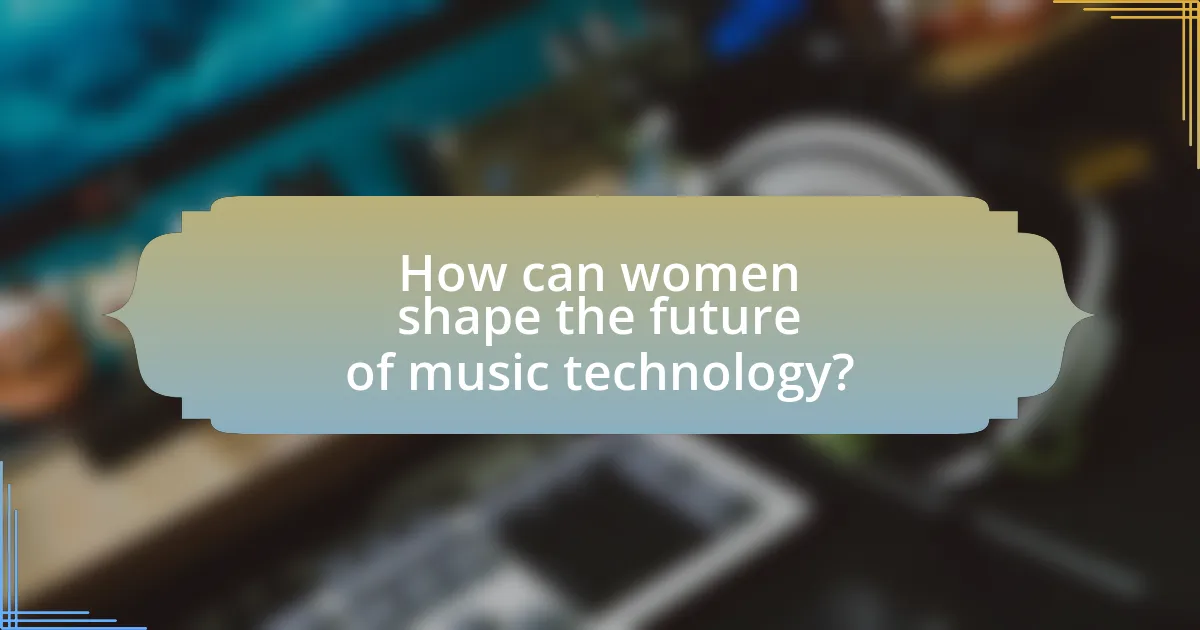
How can women shape the future of music technology?
Women can shape the future of music technology by driving innovation and diversity in the industry. Their participation in music technology roles has been shown to enhance creativity and lead to the development of more inclusive products. For instance, research from the Berklee College of Music indicates that diverse teams are 35% more likely to outperform their peers in terms of innovation. Additionally, women are increasingly taking on leadership positions in tech companies, influencing the direction of music software and hardware development. This shift not only promotes gender equality but also ensures that the needs and perspectives of a broader audience are considered in technological advancements.
What skills are essential for women to succeed in music technology?
Essential skills for women to succeed in music technology include technical proficiency, creativity, collaboration, and business acumen. Technical proficiency involves mastering software and hardware used in music production, such as digital audio workstations and sound engineering tools. Creativity is crucial for innovation in music composition and sound design, enabling women to contribute unique perspectives. Collaboration skills are necessary for working effectively in diverse teams, as music technology often involves interdisciplinary cooperation. Business acumen is important for navigating the industry, understanding market trends, and promoting one’s work. These skills collectively empower women to thrive in the evolving landscape of music technology.
How can women develop technical skills relevant to music technology?
Women can develop technical skills relevant to music technology by engaging in targeted education and hands-on experience. Enrolling in music technology courses, workshops, or online programs can provide foundational knowledge in areas such as audio engineering, music production, and software usage. Additionally, participating in internships or mentorship programs within the industry allows women to gain practical experience and network with professionals. Research indicates that women who actively seek out these educational opportunities and industry connections are more likely to succeed in technical roles, as evidenced by the increasing number of women in STEM fields, which includes music technology.
What soft skills are important for women in this industry?
Effective communication, collaboration, adaptability, and emotional intelligence are crucial soft skills for women in the music technology industry. These skills enable women to articulate their ideas clearly, work effectively in teams, adjust to rapidly changing environments, and understand the emotional dynamics of their colleagues and clients. Research indicates that strong communication skills can enhance project outcomes and foster innovation, while emotional intelligence is linked to better leadership and team cohesion. In a field that often requires collaboration across diverse groups, these soft skills are essential for success and advancement.
How can mentorship and networking impact women’s careers in music technology?
Mentorship and networking significantly enhance women’s careers in music technology by providing access to industry knowledge, resources, and opportunities. Women who engage in mentorship programs often report increased confidence and skill development, which are crucial for career advancement. For instance, a study by the Women’s Audio Mission found that 70% of women in their programs felt more empowered to pursue careers in audio engineering after receiving mentorship. Networking allows women to connect with industry leaders and peers, facilitating collaborations and job opportunities that might otherwise be inaccessible. This interconnected support system fosters a more inclusive environment, ultimately leading to greater representation of women in music technology roles.
What role do mentors play in guiding women in music technology?
Mentors play a crucial role in guiding women in music technology by providing support, knowledge, and networking opportunities. They help women navigate the industry, offering insights into technical skills and career development. Research indicates that mentorship can significantly enhance career advancement; for instance, a study by the American Psychological Association found that mentees are more likely to receive promotions and higher salaries. Additionally, mentors can foster confidence and encourage women to pursue leadership roles, addressing the gender disparity in the field.
How can women build effective networks within the industry?
Women can build effective networks within the music technology industry by actively participating in industry events, joining professional organizations, and leveraging social media platforms. Engaging in conferences, workshops, and seminars allows women to connect with peers and industry leaders, fostering relationships that can lead to mentorship and collaboration. Joining organizations such as Women in Music or the Association for Women in Music Technology provides access to resources, networking opportunities, and support systems tailored for women in the field. Additionally, utilizing platforms like LinkedIn and Twitter to share insights, showcase work, and engage with industry discussions can enhance visibility and facilitate connections. Research indicates that women who network effectively are more likely to advance in their careers, as networking is a critical factor in professional growth and opportunity access.
What is the impact of technology on women’s roles in music?
Technology has significantly expanded women’s roles in music by providing access to tools for creation, distribution, and promotion. Digital audio workstations, online platforms, and social media have enabled women to produce music independently, bypassing traditional industry gatekeepers. For instance, the rise of platforms like SoundCloud and Bandcamp has allowed female artists to share their work globally, leading to increased visibility and opportunities. Additionally, studies show that women are increasingly represented in music production roles, with initiatives aimed at closing the gender gap in technology fields. According to a report by the Annenberg Inclusion Initiative, female musicians are gaining more recognition, with a notable increase in the number of women nominated for Grammy Awards in recent years. This shift illustrates how technology not only empowers women to create but also helps to reshape the music industry’s landscape.
How is technology changing the landscape for women in music production?
Technology is significantly changing the landscape for women in music production by providing accessible tools and platforms that empower female producers. Digital audio workstations (DAWs), affordable recording equipment, and online collaboration platforms have lowered barriers to entry, enabling women to create, produce, and distribute music independently. For instance, the rise of platforms like SoundCloud and Bandcamp allows female artists to reach global audiences without traditional gatekeepers. Additionally, initiatives such as She Is The Music and Women in Music are actively promoting gender diversity in the industry, further supporting women’s involvement in music production. These advancements illustrate a shift towards inclusivity, fostering a more equitable environment for women in the music production field.
What tools and software are empowering women in music technology?
Digital audio workstations (DAWs) like Ableton Live, Logic Pro, and Pro Tools are empowering women in music technology by providing accessible platforms for music creation and production. These tools enable women to compose, record, and edit music with professional-grade features, fostering creativity and innovation. Additionally, software like GarageBand and FL Studio offers user-friendly interfaces that encourage beginners to explore music production. According to a 2021 report by the Women’s Audio Mission, women represent only 5% of the audio industry, highlighting the importance of these tools in bridging the gender gap by making music technology more approachable and inclusive.
How does technology facilitate collaboration among women in music?
Technology facilitates collaboration among women in music by providing platforms and tools that enable remote communication, sharing of resources, and collaborative creation. Digital audio workstations, cloud storage, and social media networks allow women musicians to connect, share ideas, and work together regardless of geographical barriers. For instance, platforms like SoundCloud and Bandcamp enable artists to showcase their work and collaborate on projects, while tools like Zoom and Google Meet facilitate real-time discussions and brainstorming sessions. Additionally, initiatives such as She Is The Music and Women in Music leverage technology to create networks that support female artists, fostering collaboration through mentorship and shared opportunities. These technological advancements have been instrumental in breaking down traditional barriers in the music industry, allowing women to collaborate more effectively and gain visibility.
What trends are shaping the future of women in music technology?
The future of women in music technology is being shaped by increasing representation, technological advancements, and supportive initiatives. Representation is growing as organizations like Women in Music and She Is the Music advocate for gender equality, leading to more women in leadership roles within the industry. Technological advancements, such as accessible music production software and online platforms, empower women to create and distribute music independently. Additionally, initiatives like mentorship programs and educational workshops are designed to equip women with the skills needed to thrive in this field. These trends collectively contribute to a more inclusive environment, fostering innovation and creativity among women in music technology.
How are emerging technologies influencing women’s contributions to music?
Emerging technologies are significantly enhancing women’s contributions to music by providing accessible tools for creation, collaboration, and distribution. Digital audio workstations, music production software, and online platforms enable women to produce high-quality music independently, reducing barriers traditionally faced in the industry. For instance, a report by the Annenberg Inclusion Initiative found that women accounted for 22.4% of artists in popular music in 2020, a figure that has been positively influenced by the rise of technology that allows for self-publishing and social media promotion. Additionally, initiatives like Girls Who Code and She Is The Music are leveraging technology to empower women in music, fostering a new generation of female artists and producers.
What future roles might women occupy in the evolving music technology landscape?
Women may occupy roles such as audio engineers, music producers, software developers, and technology entrepreneurs in the evolving music technology landscape. As the industry increasingly embraces diversity, women are gaining access to education and training programs that equip them with technical skills. For instance, organizations like Women in Music and She Is The Music are actively promoting female participation in music technology through mentorship and networking opportunities. Additionally, studies indicate that diverse teams lead to more innovative solutions, suggesting that women’s involvement will enhance creativity and technological advancement in music.
What practical steps can women take to thrive in music technology?
Women can thrive in music technology by actively seeking education and training in relevant fields, such as audio engineering, music production, and software development. Engaging in specialized programs, workshops, and online courses can enhance their technical skills and knowledge. For instance, organizations like Women in Music and She Is the Music provide resources and networking opportunities specifically aimed at women in the industry.
Additionally, women should build a strong professional network by attending industry events, joining forums, and connecting with mentors who can offer guidance and support. Research indicates that mentorship significantly boosts career advancement, with 70% of mentees reporting improved job satisfaction and performance.
Furthermore, women can advocate for themselves by negotiating fair pay and seeking leadership roles within their organizations. Studies show that women who negotiate salaries can earn up to 7% more than those who do not. By taking these practical steps, women can establish themselves as influential figures in the evolving landscape of music technology.
What resources are available for women pursuing careers in music technology?
Women pursuing careers in music technology can access various resources, including mentorship programs, scholarships, and professional organizations. Organizations such as Women in Music and the Association for Women in Music Technology provide networking opportunities, educational resources, and industry insights. Additionally, initiatives like the She Is the Music Foundation offer grants and support for women in the music industry. Research indicates that mentorship significantly enhances career advancement, with studies showing that women with mentors are more likely to succeed in male-dominated fields like music technology.
How can women advocate for themselves in the music technology industry?
Women can advocate for themselves in the music technology industry by actively seeking mentorship, building professional networks, and participating in industry events. Engaging with mentors provides guidance and support, while networking opens doors to opportunities and collaborations. Research indicates that women who have mentors are more likely to advance in their careers, as highlighted in a study by the American Association of University Women, which found that mentorship significantly impacts career progression. Additionally, participating in industry events allows women to showcase their skills and connect with influential figures in the field, further enhancing their visibility and opportunities for advancement.
